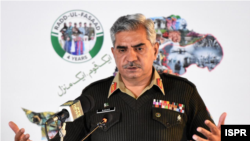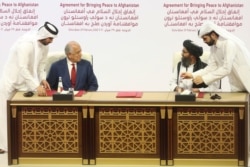Pakistan’s military said Monday that efforts aimed at moving forward a stalemated peace process in neighboring Afghanistan are “progressing in a very positive direction.”
Comments by army spokesman Maj. Gen. Babar Iftikhar follow last Friday’s visit to Pakistan by U.S. Central Command Chief Gen. Kenneth McKenzie, where he discussed with the country’s military leadership political reconciliation and peace between Afghan warring parties.
The statement also comes as U.S. President Joe Biden is nearing a decision whether to pull out the remaining 2,500 U.S. troops from Afghanistan by May 1 in line with a February 2020 agreement his predecessor, Donald Trump, signed with the Afghan Taliban.
“There are all the reasons to be optimistic about how things are advancing,” Iftikhar said at a news conference on Monday. He did not elaborate.
Iftikhar reiterated that his country is helping in the Afghan peace process because “peace in Pakistan is absolutely connected to peace in Afghanistan.”
Islamabad maintains close contacts with the Afghan Taliban and played a key role in facilitating U.S peace negotiations with the insurgents that produced the February 29 agreement the two adversaries signed in Doha, Qatar.
But soon after taking charge, the Biden administration decided to review the arrangement amid growing criticism the Taliban has not lived up to its commitments outlined in the deal and instead increased violence across Afghanistan.
The U.S. decision to review the document has raised concerns that any unilateral changes in mutually agreed timelines would disrupt the understanding and intensify Afghan bloodshed.
“Yes, there are hurdles in between, but those hurdles have been overcome before, and I am sure they will be overcome in times to come, as well,” Iftikhar said.
A crucial outcome of the deal was the start of peace talks between the Taliban and an Afghan government-sanctioned team.
The dialogue started last September after several months of bickering and little progress, but the Taliban stopped the process in January after the Biden administration announced it would conduct a review of the agreement.
The diplomatic efforts to bring the two Afghan foes back to the negotiation table in Doha seem to have encouraged them to resume some contacts after a gap of more than one month.
Taliban spokesman Mohammad Naeem said on Twitter that leaders of the two negotiating teams held a meeting in the Qatari capital Monday evening in a “cordial atmosphere” and both sides agreed to continue discussions on “setting the agenda” for the peace negotiations.
The Taliban warned of a “dangerous escalation” in the Afghan war if the U.S. reneged on its obligations outlined in the deal.
The group rejects allegations they are violating the terms of the agreement or are behind a recent wave of assassinations of government officials, journalists and civilian society figures in the Afghan capital, Kabul.
Instead, the insurgents accuse Afghan security forces of launching new operations against Taliban-held areas, saying the military actions force the group to take “only defensive actions.”
Critics are skeptical whether the Taliban will agree to any changes in the deal and will demand more concessions in return if they decide to renegotiate the timelines.
Asad Majeed Khan, Pakistan’s ambassador to the United States, said last Friday that Washington should not decide unilaterally on any extension of the May 1 deadline.
“If that is an agreement between the United States and [the] Taliban, I think the first party that needs to be consulted is [the] Taliban, and that’s where this process should start,” Khan told an online forum sponsored by the Washington-based Stimson Center think tank.
“I am sure if there is a strong justification and reasoning for having that extension for logistical or other reasons, the parties have overcome difficulties before, in terms of reaching common ground. But to present this as a fait accompli, I think, will only create difficulty,” the Pakistani ambassador said.
“It’s really also a question of the credibility of the United States as an interlocutor,” he stressed.





